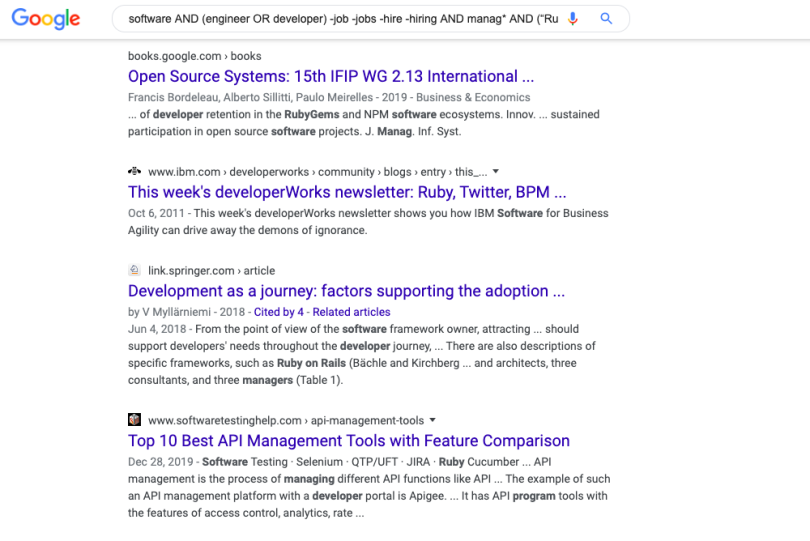

If offered the right job, there is a possibility of reeling them in. Passive candidates might not be actively seeking a job but they still have potential. We draw your attention back to a statistic mentioned at the beginning of the article.

A task that would ideally take hours can be accomplished in much lesser time and help recruiters make quicker decisions.īut a streamlined recruitment process is the not the only benefit of a Boolean Search. Why is Boolean Search important for recruiting?īoolean Search helps recruiters navigate through a labyrinth of applications with far more efficiency, a higher degree of accuracy and at a much faster speed.
#Boolean search and recruiting how to#
These are called Boolean Search Modifiers.īy using a Boolean Search, a recruiter can sort through applications who don’t meet their requirements and zero in on applications that are likely to move forward in the recruitment process.īefore we ask how to conduct a Boolean Search, it is important to understand why this search can make a world of difference for recruiters. The remaining two elements aren’t words, they are symbols – parentheses and quotation marks. the words AND, OR and NOT are called Boolean Search Operators. The first three elements of a Boolean Search i.e. Essentially, Boolean Search uses five elements to help users search for the right pool of data and utilize a data set to its maximum potential. History lesson aside, a Boolean Search will allow a user to insert words or phrases such as AND, OR, NOT to limit or even broaden and define the search results. Fun fact: the Boolean Search was built using symbolic logic developed by an English mathematician named George Boole in the 19th century. By definition, Boolean Search is a structured search process used to optimize search engine results. Instead of manually entering filters to narrow down on applications, recruiters are now using Boolean Search to sift through potential candidates. Top tips for recruiters using Boolean Search to help with their recruitment process What is a Boolean Search? If you’ve never heard of a Boolean Search, here’s a quick overview.ĩ. Filtering through online job applications might not be easy as it sounds, but that’s where Boolean Search comes into the picture. (This isn’t a bad thing and we will explain why further down in the article) Of the remaining candidates who are actively seeking jobs, the top prospects will be off the market in just 10 days.įor recruiters, hunting through online portals has become a race. The chances of them staying through the process of interviews, negotiations and finally accepting an offer are slim. These candidates have a job but are just keeping an eye on what’s out there. Passive job seekers are only looking to see what a recruiter has to offer. Of these, 73% are passive job seeker candidates. Statistics tell us that an open position is likely to receive an average of 250 applications. Easy, right? Unfortunately, here’s where it becomes difficult.

As for recruiters, they can just use the filters provided by recruitment portals and funnel down on applications worthy of the position. Today, job seekers can apply to thousands of open positions on online portals.
#Boolean search and recruiting manual#
Technology has replaced manual recruitment processes on both fronts. But as the old saying goes, “we are not in Kansas anymore!” These applications would then be hand sorted by recruiters in the hopes of finding a good candidate. There was a time when job seekers would scour through the classifieds and recruitment section in search of a job worthy of their talents and send in traditional job applications.


 0 kommentar(er)
0 kommentar(er)
